
ISBN: 9780521856294 0521856299 9780511498428 9780521122702 0511241763 9780511241765 9780511242212 0511242212 0511241267 9780511241260 051149842X 1107166349 1280567902 0511240740 0511318286 0521122708 Year: 2006 Publisher: Cambridge : Cambridge University Press,
Abstract | Keywords | Export | Availability | Bookmark
 Loading...
Loading...Choose an application
- Reference Manager
- EndNote
- RefWorks (Direct export to RefWorks)
How can the discoveries made in the biological sciences play a role in a discussion on the foundation of ethics? This book responds to this question by examining how evolutionism can explain and justify the existence of ethical normativity and the emergence of particular moral systems. Written by a team of philosophers and scientists, the essays collected in this volume deal with the limits of evolutionary explanations, the justifications of ethics, and methodological issues concerning evolutionary accounts of ethics, among other topics. They offer deep insights into the origin and purpose of human moral capacities and of moral systems.
General ethics --- Bioethics --- Ethics, Evolutionary --- Ethics, Naturalistic --- Evolutionary ethics --- Naturalistic ethics --- Ethics --- Ethical relativism --- Biology --- Biomedical ethics --- Life sciences --- Life sciences ethics --- Science --- Moral and ethical aspects --- Ethics, Evolutionary. --- Bioethics. --- Arts and Humanities --- Philosophy
Book
ISBN: 9780521719407 9780521895248 9781139167499 0521719402 0521895243 Year: 2009 Publisher: Cambridge: Cambridge university press,
Abstract | Keywords | Export | Availability | Bookmark
 Loading...
Loading...Choose an application
- Reference Manager
- EndNote
- RefWorks (Direct export to RefWorks)
General ethics --- Ethics, Evolutionary. --- Medical ethics. --- Naturalism. --- Bioethics. --- Ethical Theory. --- Ethics, Evolutionary --- Medical ethics --- Naturalism --- Materialism --- Mechanism (Philosophy) --- Philosophy --- Positivism --- Science --- Biomedical ethics --- Clinical ethics --- Ethics, Medical --- Health care ethics --- Medical care --- Medicine --- Bioethics --- Professional ethics --- Nursing ethics --- Social medicine --- Ethics, Naturalistic --- Evolutionary ethics --- Naturalistic ethics --- Ethics --- Ethical relativism --- Moral and ethical aspects
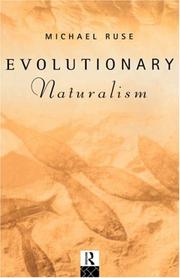
ISBN: 0415089972 0415756154 0548226024 9786610112067 1134877633 0203982185 1280112069 9780203982181 9781134877638 6610112061 9780415089975 9781280112065 9781134877584 9781134877621 9780415756150 1134877625 Year: 1995 Publisher: London ; New York : Routledge,
Abstract | Keywords | Export | Availability | Bookmark
 Loading...
Loading...Choose an application
- Reference Manager
- EndNote
- RefWorks (Direct export to RefWorks)
A collection of essays on the history and philosophy of evolutionary biology which put the theory of knowledge and of moral behaviour on a philosophical basis informed by contemporary evolutionary biological theory.
Evolution. --- Evolution (Biology) --- Ethics, Evolutionary. --- Evolution (Biology). --- Ethics, Evolutionary --- Evolution --- Animal evolution --- Animals --- Biological evolution --- Darwinism --- Evolutionary biology --- Evolutionary science --- Origin of species --- Biology --- Biological fitness --- Homoplasy --- Natural selection --- Phylogeny --- Philosophy --- Creation --- Emergence (Philosophy) --- Teleology --- Ethics, Naturalistic --- Evolutionary ethics --- Naturalistic ethics --- Ethics --- Ethical relativism

ISBN: 9781402058554 9781402058547 Year: 2007 Publisher: Dordrecht Springer
Abstract | Keywords | Export | Availability | Bookmark
 Loading...
Loading...Choose an application
- Reference Manager
- EndNote
- RefWorks (Direct export to RefWorks)
This book illuminates and sharpens moral theory, by analyzing the evolutionary dynamics of interpersonal relations in a variety of games. We discover that successful players in evolutionary games operate as if following this piece of normative advice: Don't do unto others without their consent. From this advice, some significant implications for moral theory follow. First, we cannot view morality as a categorical imperative. Secondly, we cannot hope to offer rational justification for adopting moral advice. This is where Glaucon and Adeimantus went astray: they wanted a proof of the benefits of morality in every single case. That is not possible. Moral constraint is a bad bet taken in and of itself. But there is some good news: moral constraint is a good bet when examined statistically.
ethiek --- Europees recht --- filosofie --- speltheorie --- General ethics --- Operational research. Game theory --- Evolution. Phylogeny --- Philosophy --- Contractarianism (Ethics) --- Ethics --- Ethics, Evolutionary --- Ethics, Naturalistic --- Evolutionary ethics --- Naturalistic ethics --- Ethical relativism --- Deontology --- Ethics, Primitive --- Ethology --- Moral philosophy --- Morality --- Morals --- Philosophy, Moral --- Science, Moral --- Values --- Contractarian theory (Ethics) --- Contractarianism, Moral --- Moral contractarianism
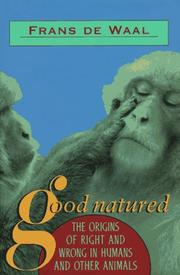
ISBN: 0674033175 9780674033177 0674356608 9780674356603 Year: 1996 Publisher: Cambridge, Mass. Harvard University Press
Abstract | Keywords | Export | Availability | Bookmark
 Loading...
Loading...Choose an application
- Reference Manager
- EndNote
- RefWorks (Direct export to RefWorks)
To observe a dog's guilty look. to witness a gorilla's self-sacrifice for a wounded mate, to watch an elephant herd's communal effort on behalf of a stranded calf--to catch animals in certain acts is to wonder what moves them. Might there he a code of ethics in the animal kingdom? Must an animal be human to he humane? In this provocative book, a renowned scientist takes on those who have declared ethics uniquely human Making a compelling case for a morality grounded in biology, he shows how ethical behavior is as much a matter of evolution as any other trait, in humans and animals alike. World famous for his brilliant descriptions of Machiavellian power plays among chimpanzees-the nastier side of animal life--Frans de Waal here contends that animals have a nice side as well. Making his case through vivid anecdotes drawn from his work with apes and monkeys and holstered by the intriguing, voluminous data from his and others' ongoing research, de Waal shows us that many of the building blocks of morality are natural: they can he observed in other animals. Through his eyes, we see how not just primates but all kinds of animals, from marine mammals to dogs, respond to social rules, help each other, share food, resolve conflict to mutual satisfaction, even develop a crude sense of justice and fairness. Natural selection may be harsh, but it has produced highly successful species that survive through cooperation and mutual assistance. De Waal identifies this paradox as the key to an evolutionary account of morality, and demonstrates that human morality could never have developed without the foundation of fellow feeling our species shares with other animals. As his work makes clear, a morality grounded in biology leads to an entirely different conception of what it means to he human--and humane.
Ethics, Evolutionary. --- Animal behavior. --- Human behavior. --- Ethics. --- Deontology --- Ethics, Primitive --- Ethology --- Moral philosophy --- Morality --- Morals --- Philosophy, Moral --- Science, Moral --- Philosophy --- Values --- Action, Human --- Behavior, Human --- Human action --- Human beings --- Human biology --- Physical anthropology --- Psychology --- Social sciences --- Psychology, Comparative --- Animals --- Animals, Habits and behavior of --- Behavior, Animal --- Animal psychology --- Zoology --- Ethologists --- Ethics, Naturalistic --- Evolutionary ethics --- Naturalistic ethics --- Ethics --- Ethical relativism --- Behavior
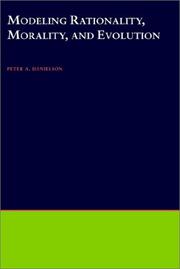
ISBN: 1280471670 1281346772 9786611346775 0585220913 9786610471676 0195352270 1602563241 9780585220918 9780195352276 9781280471674 6611346775 6610471673 0195125495 0195125509 9780195125504 0195125509 9780195125498 0195125495 0197730906 Year: 2023 Publisher: New York : Oxford University Press,
Abstract | Keywords | Export | Availability | Bookmark
 Loading...
Loading...Choose an application
- Reference Manager
- EndNote
- RefWorks (Direct export to RefWorks)
These essays focus on questions that arise when morality is considered from the perspective of rational choice and evolution. It links questions like ""is it rational to be moral?"" to the evolution of co-operation, and uses models from game theory, evolutionary biology and cognitive science.
Ethics. --- Rational choice theory. --- Ethics, Evolutionary. --- Prisoner's dilemma game. --- Ethics, Naturalistic --- Evolutionary ethics --- Naturalistic ethics --- Ethics --- Ethical relativism --- Social choice --- Deontology --- Ethics, Primitive --- Ethology --- Moral philosophy --- Morality --- Morals --- Philosophy, Moral --- Science, Moral --- Philosophy --- Values --- Decomposed prisoner's dilemma game --- Choice (Psychology) --- Social interaction
Book
ISBN: 9004263888 9789004263888 9789004263871 900426387X 9004268162 9789004268166 Year: 2014 Publisher: Leiden, Netherlands
Abstract | Keywords | Export | Availability | Bookmark
 Loading...
Loading...Choose an application
- Reference Manager
- EndNote
- RefWorks (Direct export to RefWorks)
Morality is often defined in opposition to the natural 'instincts,' or as a tool to keep those instincts in check. New findings in neuroscience, social psychology, animal behavior, and anthropology have brought us back to the original Darwinian position that moral behavior is continuous with the social behavior of animals, and most likely evolved to enhance the cooperativeness of society. In this view, morality is part of human nature rather than its opposite. This interdisciplinary volume debates the origin and working of human morality within the context of science as well as religion and philosophy. Experts from widely different backgrounds speculate how morality may have evolved, how it develops in the child, and what science can tell us about its working and origin. They also discuss how to deal with the age-old facts-versus-values debate, also known as the naturalistic fallacy. The implications of this exchange are enormous, as they may transform cherished views on if and why we are the only moral species. These articles are also published in Behaviour , Volume 151, Nos. 2/3 (February 2014). Suitable for course adoption!
Ethics, Evolutionary. --- Conscience. --- Behavior evolution. --- Human evolution. --- Primates --- Altruistic behavior in animals. --- Cognitive neuroscience. --- Neuropsychology. --- Helping behavior in animals --- Altruism --- Animal behavior --- Ethics, Naturalistic --- Evolutionary ethics --- Naturalistic ethics --- Ethics --- Ethical relativism --- Neurophysiology --- Psychophysiology --- Cognitive neuropsychology --- Cognitive science --- Neuropsychology --- Evolution (Biology) --- Physical anthropology --- Evolutionary psychology --- Human beings --- Behavioral evolution --- Guilt --- Superego --- Behavior. --- Origin
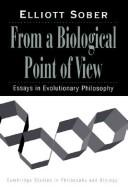
ISBN: 0521477530 0521471842 0511624948 9780521477536 9780511624940 9780521471848 Year: 1994 Publisher: Cambridge : Cambridge University Press,
Abstract | Keywords | Export | Availability | Bookmark
 Loading...
Loading...Choose an application
- Reference Manager
- EndNote
- RefWorks (Direct export to RefWorks)
Elliott Sober is one of the leading philosophers of science and is a former winner of the Lakatos Prize, the major award in the field. This new collection of essays will appeal to a readership that extends well beyond the frontiers of the philosophy of science. Sober shows how ideas in evolutionary biology bear in significant ways on traditional problems in philosophy of mind and language, epistemology, and metaphysics. Amongst the topics addressed are psychological egoism, solipsism, and the interpretation of belief and utterance, empiricism, Ockham's razor, causality, essentialism, and scientific laws. The collection will prove invaluable to a wide range of philosophers, primarily those working in the philosophy of science, the philosophy of mind, and epistemology.
Evolution. --- Biology --- Philosophy of mind. --- Ethics, Evolutionary. --- Knowledge, Theory of. --- Empiricism. --- Essentialism (Philosophy) --- Time. --- Philosophy. --- Essentialism (Philosophy). --- Empiricism --- Ethics, Evolutionary --- Evolution --- Knowledge, Theory of --- Philosophy of mind --- Time --- Ethics, Naturalistic --- Evolutionary ethics --- Naturalistic ethics --- Ethics --- Ethical relativism --- Essence (Philosophy) --- Philosophy --- Substance (Philosophy) --- Experience --- Rationalism --- Vitalism --- Hours (Time) --- Geodetic astronomy --- Nautical astronomy --- Horology --- Mind, Philosophy of --- Mind, Theory of --- Theory of mind --- Cognitive science --- Metaphysics --- Philosophical anthropology --- Epistemology --- Theory of knowledge --- Psychology --- Creation --- Emergence (Philosophy) --- Teleology --- Arts and Humanities
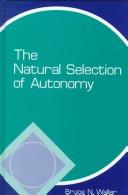
ISBN: 0585092222 9780585092225 0791438198 0791438201 1438423128 9781438423128 Year: 1998 Publisher: Albany, N.Y. : State University of New York Press,
Abstract | Keywords | Export | Availability | Bookmark
 Loading...
Loading...Choose an application
- Reference Manager
- EndNote
- RefWorks (Direct export to RefWorks)
Autonomy (Philosophy) --- Responsibility. --- Biology --- Animal welfare. --- Ethics, Evolutionary. --- Ethics, Naturalistic --- Evolutionary ethics --- Naturalistic ethics --- Ethics --- Ethical relativism --- Abuse of animals --- Animal cruelty --- Animals --- Animals, Cruelty to --- Animals, Protection of --- Animals, Treatment of --- Cruelty to animals --- Humane treatment of animals --- Kindness to animals --- Mistreatment of animals --- Neglect of animals --- Prevention of cruelty to animals --- Protection of animals --- Treatment of animals --- Welfare, Animal --- Vitalism --- Accountability --- Moral responsibility --- Obligation --- Supererogation --- Philosophy --- Philosophy. --- Abuse of --- Social aspects --- Autonomy (Philosophy).
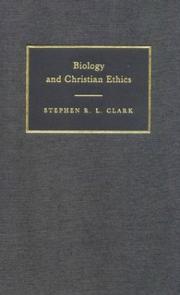
ISBN: 9780511605840 9780521561310 9780521567688 0511010206 9780511010200 0511605846 0521561310 9780511053504 0511053509 0511151551 9780511151552 0521561310 0521567688 1107113172 0511172702 0511310714 1280429097 Year: 2000 Publisher: Cambridge : Cambridge University Press,
Abstract | Keywords | Export | Availability | Bookmark
 Loading...
Loading...Choose an application
- Reference Manager
- EndNote
- RefWorks (Direct export to RefWorks)
This stimulating and wide-ranging book mounts a profound enquiry into some of the most pressing questions of our age, by examining the relationship between biological science and Christianity. The history of biological discovery is explored from the point of view of a leading philosopher and ethicist. What effect should modern biological theory and practice have on Christian understanding of ethics? How much of that theory and practice should Christians endorse? Can Christians, for example, agree that biological changes are not governed by transcendent values, or that there are no clear or essential boundaries between species? To what extent can 'Nature' set our standards? Professor Clark takes a reasoned look at biological theory since Darwin and argues that an orthodox Christian philosophy is better able to accommodate the truth of such theory than is the sort of progressive, meliorist interpretation of Christian doctrine which is usually offered as the properly 'modern' option.
Biology --- Christian ethics --- Ethics, Evolutionary --- 241.63*5 --- Life sciences --- Biomass --- Life (Biology) --- Natural history --- 241.63*5 Theologische ethiek: bio-ethiek (bioethiek); genetische experimenten; transplantatie; eugenetica --- Theologische ethiek: bio-ethiek (bioethiek); genetische experimenten; transplantatie; eugenetica --- Ethics, Naturalistic --- Evolutionary ethics --- Naturalistic ethics --- Ethics --- Ethical relativism --- Ethical theology --- Moral theology --- Theology, Ethical --- Theology, Moral --- Christian life --- Christian philosophy --- Religious ethics --- Religious aspects&delete& --- Christianity --- Christian ethics. --- Ethics, Evolutionary. --- Religious aspects --- Christianity. --- Biologie --- Morale chrétienne --- Arts and Humanities --- Religion

 Search
Search Feedback
Feedback About
About Help
Help News
News